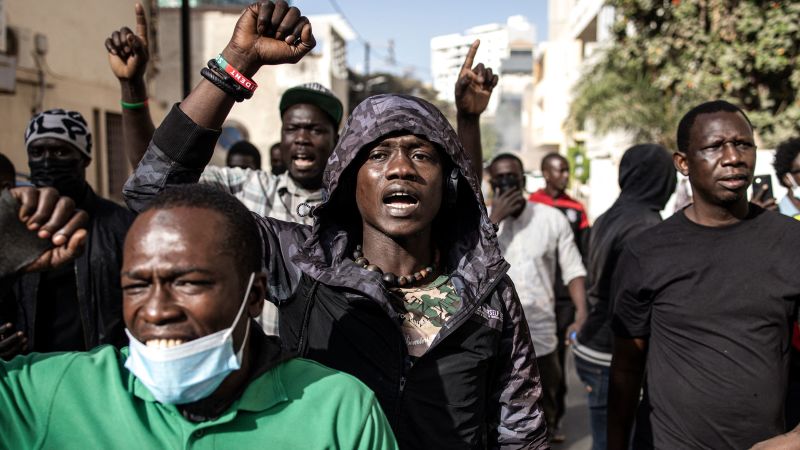
Senegal's Political Turmoil: A Nation on the Brink

Senegal, known for its political stability in a volatile region, faces a critical juncture as upcoming elections are unexpectedly postponed, sparking widespread unrest and fears of a power grab.
The Political Upheaval
Senegal's reputation for political stability in a region marred by volatility is now under threat as the country grapples with a sudden postponement of its upcoming general elections. The decision, made just weeks before the scheduled date, has ignited tensions and raised concerns about the future of democracy in the West African nation.
Protesters gesture after police fired teargas at them outside the General Assembly in Plateau, Dakar on February 5, 2024.
The postponement of the elections by outgoing President Macky Sall, amidst disputes over the exclusion of opposition candidates, has triggered a wave of protests and unrest in the streets. The move, seen by many as an attempt to extend Sall's rule, has cast a shadow over Senegal's democratic credentials and regional stability.
President Macky Sall's silence on whether or not he would seek a third term ignited an already tense political climate.
The unexpected turn of events has not only jeopardized Senegal's position as a beacon of democracy in West Africa but has also drawn attention to the potential ripple effects on the region, which has seen a rise in military takeovers in recent years. The political turmoil in Senegal has put the nation on edge, with fears of escalating violence and further disruptions to the electoral process.
Unrest and Tensions
Following the announcement of the election delay, Senegal's capital Dakar has become a hotspot of unrest and clashes between protesters and security forces. The government's decision to shut down mobile internet services and suspend a private television channel has sparked outrage and accusations of suppressing freedom of expression.
The use of tear gas to disperse protesters, the arrest of opposition figures, and the closure of businesses and schools in parts of the country have further escalated the situation. Amnesty International has condemned the government's actions as a violation of human rights and called for restraint in handling the protests.
The ongoing turmoil in Dakar has put the country's democracy in jeopardy, with concerns growing over the escalating violence and the government's crackdown on dissent. The international community has expressed alarm over the situation and urged all parties to uphold peace and respect democratic norms.
International Response and Future Outlook
As Senegal faces a deepening political crisis, international partners, including the Economic Community of West African States (ECOWAS) and France, are closely monitoring the situation. Calls for a swift resolution to the electoral impasse and a return to democratic processes have echoed from various quarters, emphasizing the importance of upholding stability and peace in Senegal.
With the elections now pushed back to the end of the year, Senegal stands at a critical juncture, balancing on the edge of uncertainty and potential unrest. The resilience of the Senegalese people in defending their democracy and demanding accountability from their leaders signals a turbulent road ahead for the nation.
Despite the challenges and uncertainties that lie ahead, Senegal's journey towards resolving its political turmoil and safeguarding its democratic principles remains a focal point for both domestic and international stakeholders. The coming months will test the resilience of Senegal's democracy and the commitment of its leaders to uphold the will of the people.








